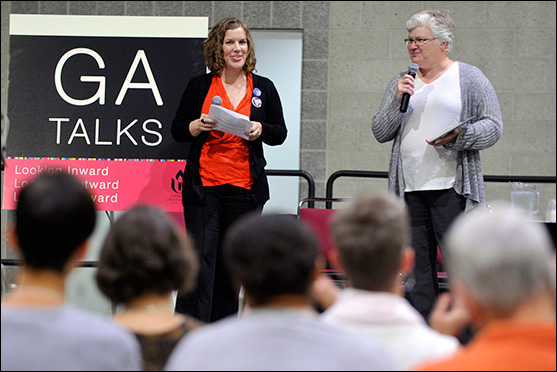
New crowdfunding site draws $100K for UU projects
Donors pledge $100,000 through Faithify.org for Unitarian Universalist projects in first two months.
“UUs are looking for new ways to engage their faith,” said the Rev. Elizabeth Nguyen, who serves on the board of UUCC. “We’re looking for deeper ways to do our social justice work, new ways to bring our values into the public sphere, and more meaningful spiritual practices to build community together.”
Faithify is already helping two dozen other UU enterprises locate new partners, too. In the two months since its launch June 25 at the 2014 General Assembly in Providence, R.I., Faithify has inspired pledges of more than $100,000 from almost 700 people.
“Faithify is an amazing opportunity for our movement, because like the Lucy Stone Co-op, we’re asking our denomination to dream bigger about what UUism can be,” Nguyen said. “We’re both asking, ‘What does this faith look like seven days a week and what new programs or innovations will get us there?’”
Not every project promoted on Faithify is as financially ambitious as UUCC’s second cooperative house. The combined youth group of First Universalist Society and the nearby First Congregational Church (UCC) of Hartland, Vt., successfully raised $400 from 14 funders for its ninth annual mission trip to work with agencies focused on homelessness, poverty, and hunger in New Haven, Conn.
“The $400 we raised through Faithify was a major factor for us in being able to carry out our mission trip this year,” said the Rev. Paul Sawyer, minister of First Universalist Society. “And though our project was small and relatively simple, working with Faithify also brought us some amazing connections that would have been very hard to make in other ways.”
Like other crowdfunding sites, Faithify stipulates an all-or-nothing payment model, meaning a project has to reach its full fundraising goal in 60 days or less or it won’t receive any funding. The size and scope of the projects vary considerably, with costs from a few hundred to a few thousand dollars.
“Faithify’s most overarching goal is to inspire innovation: to help people cross geographical, generational, and congregational boundaries,” said the Rev. Sue Phillips, the regional lead for the UUA’s New England Region, who developed Faithify with Hilary Allen, congregational development director for the Northern New England District.
For an initial cost of close to $50,000 for website development, marketing, and program management, most of which came from the UUA’s Massachusetts Bay District, the concept and original name—The UU Fund—soon became Faithify.
“We quickly realized that it’s not a fund, but a platform,” Allen said. “Developing it was a technical project, but at every stage we stopped and gathered people together to talk about what we were doing and how best to do it.”
The central question Faithify poses to project applicants is how their project claims and is claimed by Unitarian Universalism. “This was the hardest philosophical piece, and every way we turned huge questions loomed,” Phillips said. “In the end, we decided it means being in covenant with others, making an active choice to speak from and out of UU tradition and values.”
Although not every applicant is a member of a UU congregation, each project needs to identify some relationship with a UU entity. “This is a paradigm shift [in the way projects are funded],” Phillips said. “We’re not the grantmakers or gatekeepers beyond verifying a UU connection.”
Phillips and Allen said that most project applicants have been and will likely continue to be UU members. But as time goes on, they anticipate more interest from the interfaith and nondenominational community who can demonstrate a relationship with Unitarian Universalism in the absence of a direct congregational connection.
“We want to inspire imagination,” Allen said. “If you talk to some folks with a great idea, the first thing they say is there’s no money. We hope this makes people think more boldly about what’s possible.”
For Allen, Faithify is distinctly Unitarian Universalist because “the movement has a penchant for democracy and crowdfunding democratizes fundraising,” she said. “Ultimately what Faithify does is help us reach beyond our traditional boundaries. Unless a ministry is featured in UU World, at General Assembly, or manages to penetrate the social media overload, I don’t hear about it. Faithify diminishes that reality by exposing all of us to vital ministries emerging in our midst.”
And Faithify doesn’t simply raise money. Putting a project proposal together for the website can invigorate a congregation or group by drawing on a wide range of talents.
Throop Memorial UU Church in Pasadena, Calif., raised $5,000 from 53 funders for its “Let it Rain” campaign to fund the creation of a rainwater harvesting and education program. “I had a great team of people who worked on various aspects of the project,” said the Rev. Tera Little, “from creating the excellent video and providing copy for the website, to drawing a beautiful illustration of our project and writing the thank you cards once our project was successful. It was a great team-building exercise which got folks engaged and really proud about what’s happening at Throop.”
Photograph (above): Hilary Allen and the Rev. Sue Phillips introduce Faithify at a General Assembly presentation in Providence, R.I., in June (© Nancy Pierce/UUA). See sidebar for links to related resources.
Comments powered by Disqus






